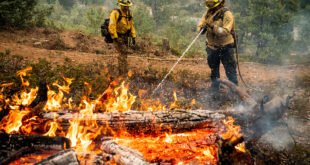Where water should be flowing, a dry irrigation ditch is filled instead with a row of shacks–yet another sign of the drought.
"Because of the problem right now that the state is facing of water deliveries not coming in where the farms [could be] producing crops and could more or less put people to work–this is the condition you’re seeing," says Robert Silva, mayor of Mendota.
About 30 people call an encampment home that’s just about a mile north of Mendota city limits.
Mayor Silva joins us out there. Now in the fourth dry year, Silva believes many migrant farm workers ended up here, out of work, because we are out of water.
"Because of the drought situation, conditions, you’re going to see a lot of these conditions all over Central California," Silva says.
Much of the work force in the rural west side of Fresno County depends on agriculture.
And many in these communities, including those in this encampment, are being hit particularly hard by the drought.
But Silva says many of the people living here aren’t from Mendota.
"This is as far as they got following the crops in California," Silva says. "And this is an area where they really don’t want to, don’t have enough money or they don’t want to live in the community."
Down the road near Coalinga, we meet Ismael Reyes at Harris Farms where he’s worked as an irrigation manager for 23 years.
Dealing with a zero water allocation, they’re having to fallow fields, putting many farm workers out of a job.
"Basically, I don’t have the jobs–I don’t have the work for them. That’s one of the things about the drought, you can only plant–like right now, we’re only planting very little," Reyes says.
Right now, more than 400 workers are harvesting asparagus at Harris Farms.
But when the season is done, so are the workers. Reyes says most of them will be laid off.
"Usually, it would be ok because there was other crops that they could go and work on," Reyes says.
But not this year. Not without water.
"This field right here was in bell peppers before, before this. It’s been like this for the last two years," Reyes says pointing to an empty, dry field.
And across the way from where Reyes stands, there should be cantaloupes.
But where water doesn’t flow, crops don’t grow.
"It’s causing chaos for us. It’s uncertainty. There is no tomorrow," Reyes says.
It’s a situation Teodoro Gregorio has been witnessing with the crews he supervises.
They’re leaving the area or the state–many, he says, simply not immigrating from across the border to begin with.
"Years ago, there would be more than enough people to do the work," Gregorio explains in Spanish. "But now there’s a little bit of work, and there’s a little bit of people."
He estimates that the crews have been reduced by more than half in the past few years.
"Where do they go? That’s a good question because they’re just gonna have to go wherever there’s a job," Reyes says.
The drought is taking these workers farther away from the Central Valley.
"We have crews who sometimes leave. They follow the season. They go to Stockton, or Oregon. And they go until the season finishes," Gregorio says.
He says some will take their families with them. Others will leave them in the Central Valley.
It’s where some of these workers have laid down roots.
"The effect is not just the farm worker–it’s the communities, it’s the schools, it’s the business," Reyes says.
Mayor Silva agrees. He says trends like these negatively impact the economy. Fewer jobs mean fewer dollars to spend at local businesses.
Back at the homeless encampment–
"As many years as I’ve lived in this area, I’ve never seen conditions like this," Silva says.
Several men say they used to work in the fields.
Their stories are different, and they’ve ended up here for different reasons. But Silva believes their situation would not be as dire if rural Fresno County wasn’t suffering from the drought the way it is.
"I really doubt it. I really doubt it because when there’s work, it seems like the whole family is working," Silva says.
For the rural west side, no water, means fewer jobs, leaving at least this snapshot of people in west Fresno County living like they are in a third world country.
 Mariposa Fire Mountain Community Fire Information
Mariposa Fire Mountain Community Fire Information

Wanna Comment?